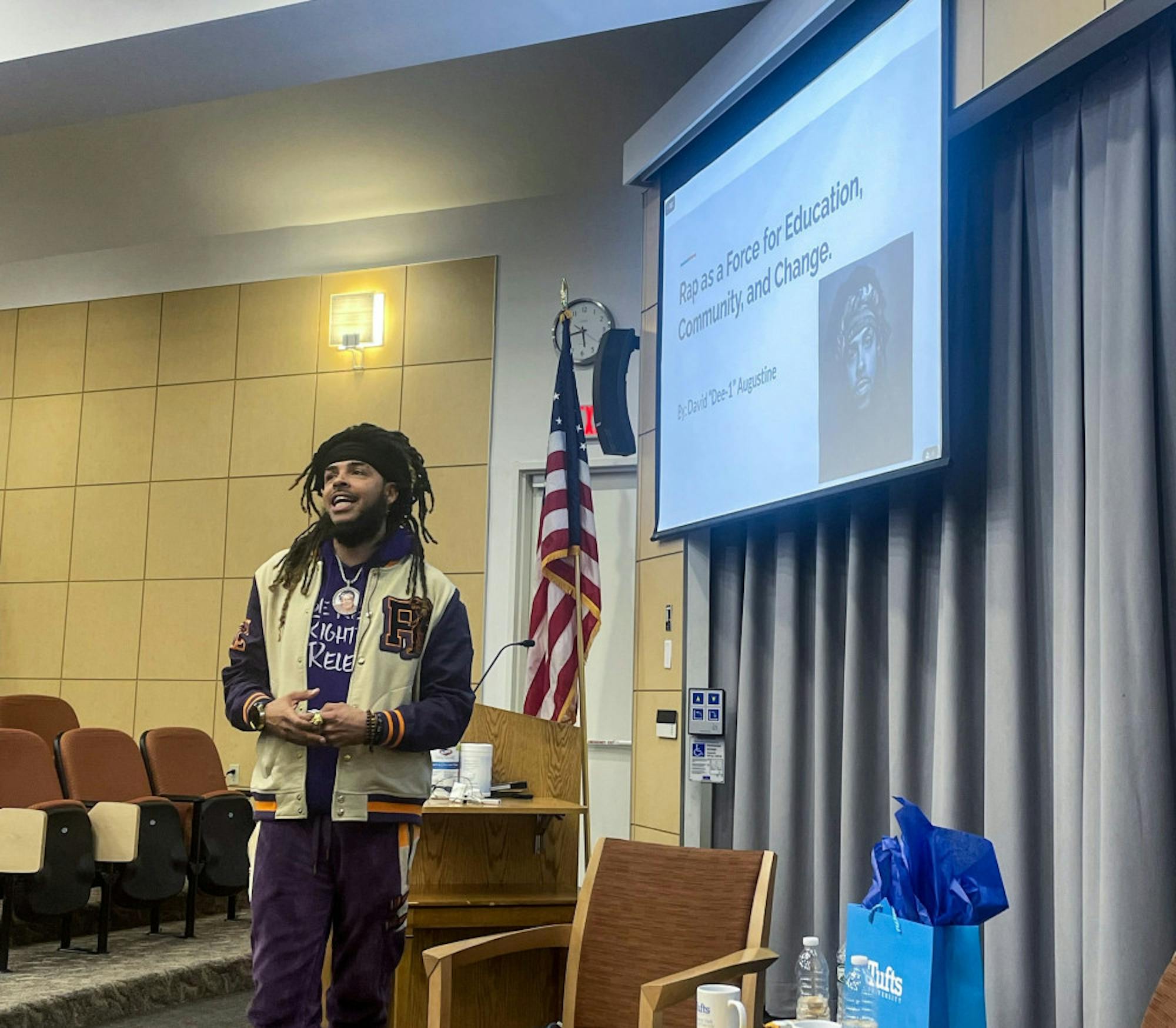Rapper, activist and educator Dee-1 spoke about hip-hop as a force for social justice, education and community engagement on April 19 as part of the Tisch College Solomont Speaker Series.
Dee-1 currently serves as the Nasir Jones Hip-Hop Fellow at Harvard University and is the recipient of the 2020 NAACP “Power of Influence Award,” highlighting his activism and commitment to inspiring youth. His recent album, “Finding Balance” (2022) debuted at No. 4 in the world on the Apple Music/iTunes Hip-Hop Charts.
Dayna Cunningham, dean of the Jonathan M. Tisch College of Civic Life, opened the event by acknowledging that fellow rapper, record producer, entrepreneur and MIT Visiting Professor Lupe Fiasco could not attend as scheduled.
She situated the event in the context of hardships currently facing Black Americans, noting the recent shooting of Ralph Yarl, a Black teen who was shot by a white homeowner after he rang the wrong doorbell when picking up his younger siblings.
“What really hurts is that after being shot … this 16-year-old, doe-eyed boy goes from house to house seeking help, and nobody would help him,” Cunningham said. “He finally knocks on the third door, and somebody says, ‘I won’t let you in, but I’ll call EMS.’ And it makes me wonder sometimes what kind of country we live in. That is the context for this conversation tonight.”
Dee-1 began his lecture in artistic form, giving the audience a synopsis of the music he produces and its deeper significance.
“I need another title / I’m no longer a rapper / I’m a rhyming revolutionary / authoring chapters / In this book we call life / here to give you instructions / on fighting self-destruction / over beautiful production,” Dee-1 rapped.
As Dee-1 began describing the function of rap as a teaching tool, an audience member informed him and event administrators that racist messages from the livestream’s chat function were appearing on the screen. Dee-1 decided to proceed with the conversation without the prepared slideshow, an act praised by both Cunningham and University President Anthony Monaco in an email sent to the Tufts community the next morning.
“That teaches us about the kind of stuff we just spoke about, called grit,” Dee-1 said. “Grit is the ability to keep going, even when things may not be convenient, may not even be in your favor, so if it’s okay with y’all, we’re gonna keep going.”
To exemplify the impact that rap music can have on students’ learning, Dee-1 recounted his experience as a middle school math teacher after graduating from college.
“While I’m teaching, I’m realizing that my students are learning the lyrics to their favorite rap songs way quicker than they are learning the long division and the multiplying of decimals and fractions that I’m trying to teach them,” Dee-1 said.
Dee-1 noted that rappers carry a lot of responsibility: if they spread falsehoods in their music, their fans might perceive their words as the truth.
“If you’re a teacher, and you got a class full of impressionable students, and you tell them that six times six is 43, … if they don’t know any better, they’re gonna be like, I just learned something,” he said. “If you make it sound good, it’s not only just something that’s being taught, but it’s something that has a rhythm to it. … Six times six is 43. Six times six is 43. … Now, it’s really stuck in your head.”
Given how impressionable their audiences can be — especially younger ones — Dee-1 said that rappers must always reflect on the potential impact of their lyrics.
“What if inherently, underneath the rhythm … underneath the catchiness, what if … what you’re teaching is cap — it’s not a fact?” Dee-1 continued. “Even if it is something that you might say, ‘Well, this is my truth,’ you have to ask yourself, ‘Is it healthy that you’re teaching this?’”
Dee-1 emphasized that everyone involved in hip-hop — whether they be a commissioner, creator or consumer — has a responsibility to ensure that hip-hop makes a positive influence.
“People who play the role of commissioners … have to ask themselves, ‘What am I incentivizing creators to want to create?’” he said. “Many artists who are creators, they will simply go where the money is.”
Dee-1, whose real name is David Augustine, then talked about his infatuation with the biblical story of David and Goliath, the namesake for one of his first albums. He encouraged the audience to find and utilize their own gifts — or “slingshots” — against their own metaphorical Goliaths, the same way Dee-1 did through rap.
“I said, ‘Oh, I’m David,’ the difference is my Goliath doesn’t look like a big nine-foot giant,” he said. “My Goliath might look like poverty growing up in the Ninth Ward of New Orleans. … My Goliath looks like discrimination, being a Black man in America.”
Dee-1 expressed pride in his academic and career achievements, sharing that accomplishments like his own are often not publicized by others in the hip-hop industry because they deviate from public perceptions of rappers.
“Y’all know how many rappers have [4.0 GPAs] in school, but they don’t tell you that?” Dee-1 said. “I had to learn that being my most authentic self is embracing all of the things that don’t typically fit into being a rapper that make me special. So, yes, I brag on being a college graduate … on being at Harvard … [and] on being a middle school teacher. … I learned to embrace those things, because that’s what makes me authentic.”






